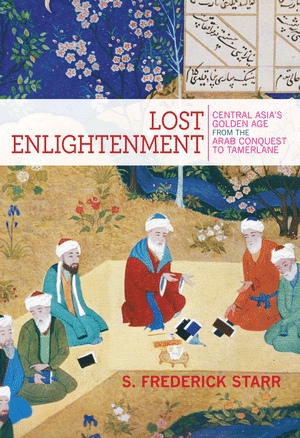Relevant books:

In this sweeping and richly illustrated history, S. Frederick Starr tells the fascinating but largely unknown story of Central Asia's medieval enlightenment through the eventful lives and astonishing accomplishments of its greatest minds--remarkable figures who built a bridge to the modern world. Because nearly all of these figures wrote in Arabic, they were long assumed to have been Arabs. In fact, they were from Central Asia--drawn from the Persianate and Turkic peoples of a region that today extends from Kazakhstan southward through Afghanistan, and from the easternmost province of Iran through Xinjiang, China.
Lost Enlightenment recounts how, between the years 800 and 1200, Central Asia led the world in trade and economic development, the size and sophistication of its cities, the refinement of its arts, and, above all, in the advancement of knowledge in many fields. Central Asians achieved signal breakthroughs in astronomy, mathematics, geology, medicine, chemistry, music, social science, philosophy, and theology, among other subjects. They gave algebra its name, calculated the earth's diameter with unprecedented precision, wrote the books that later defined European medicine, and penned some of the world's greatest poetry. One scholar, working in Afghanistan, even predicted the existence of North and South America--five centuries before Columbus. Rarely in history has a more impressive group of polymaths appeared at one place and time. No wonder that their writings influenced European culture from the time of St. Thomas Aquinas down to the scientific revolution, and had a similarly deep impact in India and much of Asia.
Lost Enlightenment chronicles this forgotten age of achievement, seeks to explain its rise, and explores the competing theories about the cause of its eventual demise. Informed by the latest scholarship yet written in a lively and accessible style, this is a book that will surprise general readers and specialists alike.

Current discussions in the West on the relation of science and religion focus mainly on science’s uneasy relationship with the traditional Judeo-Christian view of life. But a parallel controversy exists in the Muslim world regarding ways to integrate science with Islam. As physicist Taner Edis shows in this fascinating glimpse into contemporary Muslim culture, a good deal of popular writing in Muslim societies attempts to address such perplexing questions as:
• Is Islam a "scientific religion"?
• Were the discoveries of modern science foreshadowed in the Quran?
• Are intelligent design conjectures more appealing to the Muslim perspective than Darwinian explanations?
Edis examines the range of Muslim thinking about science and Islam, from blatantly pseudoscientific fantasies to comparatively sophisticated efforts to "Islamize science." From the world’s strongest creationist movements to bizarre science-in-the-Quran apologetics, popular Muslim approaches promote a view of natural science as a mere fact-collecting activity that coexists in near-perfect harmony with literal-minded faith. Since Muslims are keenly aware that science and technology have been the keys to Western success, they are eager to harness technology to achieve a Muslim version of modernity. Yet at the same time, they are reluctant to allow science to become independent of religion and are suspicious of Western secularization.
Edis examines all of these conflicting trends, revealing the difficulties facing Muslim societies trying to adapt to the modern technological world. His discussions of both the parallels and the differences between Western and Muslim attempts to harmonize science and religion make for a unique and intriguing contribution to this continuing debate.

The Islamic scientific tradition has been described many times in accounts of Islamic civilization and general histories of science, with most authors tracing its beginnings to the appropriation of ideas from other ancient civilizations--the Greeks in particular. In this thought-provoking and original book, George Saliba argues that, contrary to the generally accepted view, the foundations of Islamic scientific thought were laid well before Greek sources were formally translated into Arabic in the ninth century. Drawing on an account by the tenth-century intellectual historian Ibn al-Nadim [macron over i] that is ignored by most modern scholars, Saliba suggests that early translations from mainly Persian and Greek sources outlining elementary scientific ideas for the use of government departments were the impetus for the development of the Islamic scientific tradition. He argues further that there was an organic relationship between the Islamic scientific thought that developed in the later centuries and the science that came into being in Europe during the Renaissance.Saliba outlines the conventional accounts of Islamic science, then discusses their shortcomings and proposes an alternate narrative. Using astronomy as a template for tracing the progress of science in Islamic civilization, Saliba demonstrates the originality of Islamic scientific thought. He details the innovations (including new mathematical tools) made by the Islamic astronomers from the thirteenth to sixteenth centuries, and offers evidence that Copernicus could have known of and drawn on their work. Rather than viewing the rise and fall of Islamic science from the often-narrated perspectives of politics and religion, Saliba focuses on the scientific production itself and the complex social, economic, and intellectual conditions that made it possible.

For over 700 years the international language of science was Arabic. Surveying the golden age of Arabic science, Jim Al-Khalili reintroduces such figures as the Iraqi physicist Ibn al-Haytham, who practised the modern scientific method over half a century before Bacon; al-Khwarizmi, the greatest mathematician of the medieval world; and Abu Rayhan al-Biruni, a Persian polymath to rival Leonardo da Vinci.

This is a study of the long-standing question of why modern science arose only in the West and not in the civilizations of Islam or China, despite the fact that, by the Middle Ages, Islam and China were more scientifically advanced. To find an explanation the author examines the differences in religious, philosophical, and legal institutions of the three civilizations, focusing on the legal concept of 'corporation', which is unique to the West and gave rise to neutral space and free inquiry, concepts integral to modern science.